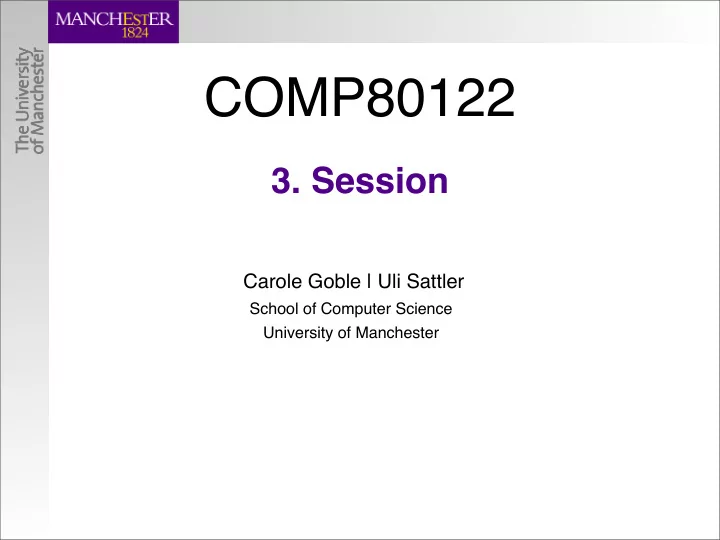

COMP80122 3. Session Carole Goble | Uli Sattler School of Computer Science University of Manchester
Communication of research The slides The speaker The story • • • bullet lists body language story lines • • – focus graphics clarity • • • fonts preparedness level • • • highlights voice timing • • ... – volume use of terminology • – speed ... – clarity • nerves • ... Effects on you/audience by choices to these?
Giving a Good Presentation: Terminology, Storyline, Voice, Body Language, and Coping with Nerves Organisation of your Presentations
Know you Area & Terminology • “How does this relate to biometric annealing?” • “Wouldn’t the Kartoffelpuffer approach work faster?” • Diligently – read – understand – take notes – ask – discuss • Don’t assume or make up new words
Storyline - before you start • Think long & hard about – core points/claims you want to make about • your work • existing work • applications – terminology to use • Write these down • Order them • Discuss with supervisor • ...only then start on slides
Storyline - a suggestion • Setting the scene: – what is this about? – why should I bother? • Background, existing work, solutions – what have others done so far? – what else is missing? • My/our contribution – what have we done? – what are the lessons learnt/insights gained? • Outlook – what else needs doing?
Storyline - questions � • Do we want an overview at start? • Do we want a summary at end? • How do I explain holes/shortcomings in others’ work? • How do I explain holes/shortcomings in my work? • What if I cannot explain everything in detail? • Which bits to leave out? • ...later: which slides carry this storyline
Voice • Badly affected by nerves – higher pitch – loss of volume control • Central medium for oral presentation – if you worry about your voice, do something: • try it out with a friend • follow some online tutorials “voice projection” – your voice is trainable • but this needs time and effort
Body Language • Your observations from RS about body language? • Talk to the audience! • Look at the audience! • Show some enthusiasm! • Don’t talk to the wall/laptop/screen! • Find a good place for your hands! • Careful with props!
Body language - how to dress? • Is dress/clothes important for your presentation? • Effects of presentation situation: you will feel – very warm – looked at by many eyes • ...hence you want to feel – comfortable even if you are sweating – good in your skin/clothes
Coping with nerves � • Your observations? – who is stressed/nervous? – what do stressed presenters do? – how does that make the audience feel? • What can we do about it? – accept it – be super well prepared – learn relaxation techniques – avoid counter-productive reactions • procrastination • low voice/high pitch • talking to wall/ceiling/...
Organisation of your presentations
Your COMP80122 presentation: • will take 15 minutes • describes your research, from your – PhD – taster project – MSc – or similar, whatever you think is suitable • will take place in small groups (~11 people) • will be discussed in detail
To pass COMP80122, you • submit your 10 critiques – which you should have done already • give your presentation – and take note of its discussion • attend your fellow students’ presentations – and partizipate in their discussions
Recommend
More recommend